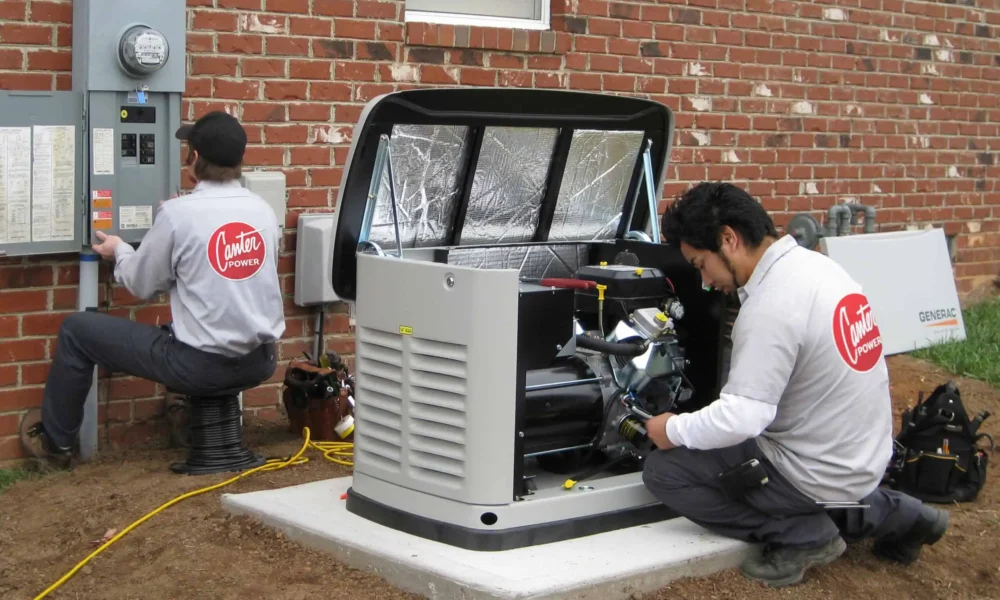What is the Average Generator Installation Cost in Louisiana? A Breakdown of Key Factors

When unpredictable weather patterns, hurricanes, and grid issues strike Louisiana, backup power becomes more than a luxury—it becomes a necessity. Whether you’re a homeowner preparing for storm season or a business owner looking to keep operations running smoothly, investing in a generator is a wise move. But before you make the leap, it’s crucial to understand the average generator installation cost in Louisiana and what factors influence it.
In this comprehensive guide, we’ll discuss the cost variables, compare different types of generators, and outline what to expect when installing one in the Pelican State.
Average Generator Installation Cost in Louisiana
On average, the generator installation cost in Louisiana ranges from $5,000 to $15,000 or more, depending on the system’s size, type, and complexity of the installation. Here’s a general pricing breakdown:
- Portable generators: $500–$2,500 (not including transfer switch installation)
- Standby generators (whole-house): $7,000–$15,000 (including unit and installation)
- Commercial-grade generators: $10,000–$30,000+ depending on load and usage
These prices reflect both the generator unit itself and the cost of installation, which includes electrical work, permitting, concrete pads, and possibly fuel line connections (natural gas or propane).
Key Factors That Affect Generator Installation Cost
Several variables affect how much you’ll ultimately pay for generator installation in Louisiana. Below are the most critical factors to keep in mind:
- Generator Type and Capacity (kW)
The most significant factor influencing cost is the type and size of the generator:
- Portable generators: Generally inexpensive but require manual operation and often cannot power the whole house.
- Standby generators: Automatically switch on during an outage and can power your entire home or selected circuits. They are more expensive but offer convenience and reliability.
- Inverter generators: More efficient and quieter than traditional portables, but still not ideal for whole-house use.
- Commercial/industrial generators: Built for higher power demands, these units are significantly more expensive and require more complex installations.
💡 Tip: The larger the generator’s power output (measured in kilowatts), the more you’ll pay. A 20kW generator costs significantly more than a 10kW model.
- Fuel Type and Infrastructure
Generators can be powered by:
- Natural gas
- Propane
- Diesel
- Gasoline
Natural gas is often preferred in Louisiana due to existing infrastructure and long-term cost efficiency. However, if a gas line isn’t already available, connecting one can significantly increase your generator installation cost, sometimes by $1,000 to $3,000.
Propane is a popular alternative but requires a storage tank. Diesel is common for commercial use but less favored for homes due to fuel storage and emissions concerns.
- Installation Site and Accessibility
Your property layout can impact the labor and materials needed:
- Concrete pad installation: Some generators require a stable platform, which may cost $500–$1,500.
- Wiring distance: The farther your generator is from your electrical panel or gas source, the more wiring and conduit are required.
- Obstacles and landscaping: Tight spaces or uneven terrain could require excavation or special mounting, raising labor costs.
- Electrical Upgrades
A licensed electrician will assess your home’s electrical system. If your panel is outdated or insufficient for the load, you may need:
- Panel upgrade: $1,000–$3,000
- Transfer switch: $500–$1,500 depending on type (manual vs. automatic)
- Load management systems: Needed for smarter power distribution
These additions will drive up your generator installation cost, but are essential for safety and code compliance.
- Permitting and Inspection Fees
Most Louisiana municipalities require permits for generator installation. The cost varies depending on location, but typically falls between $100 and $500.
Inspections may be necessary for:
- Electrical work
- Gas line installation
- Overall zoning and noise regulations
Failing to comply can result in fines or delays, so always work with a licensed contractor familiar with local codes.
- Brand and Warranty Coverage
Top generator brands like Generac, Kohler, Cummins, and Briggs & Stratton have varying price points. While you might pay more upfront for a reputable brand, longer warranties and service networks can provide peace of mind and potentially lower long-term maintenance costs.
Some brands also offer extended warranties (5–10 years), which may be included in higher-tier installation packages or purchased separately.
Regional Considerations in Louisiana
- Hurricane Season Prep
Louisiana’s storm-prone geography makes generator installations more urgent. Installers often see a spike in demand between May and November, which can lead to:
- Longer wait times
- Higher labor costs due to demand
- Rush fees for expedited service
To avoid peak-season premiums, it’s smart to schedule your installation in late winter or early spring.
- Local Utility Rebates and Incentives
Some Louisiana utility companies and local governments offer rebates or incentives for energy resilience improvements, especially if your generator is integrated with solar power or battery systems. Check with:
- Entergy Louisiana
- Cleco Power
- Local parish offices
These programs won’t eliminate your generator installation cost, but they can ease the burden by a few hundred dollars.
Installation Timeline: What to Expect
A typical standby generator installation follows this timeline:
- Initial consultation and load assessment (1–2 days)
- Permit applications and approvals (up to 2 weeks)
- Site prep and concrete pad installation (1 day)
- Electrical and gas line setup (1–2 days)
- Inspection and final testing (1–3 days)
From start to finish, expect the process to take 2–4 weeks, depending on complexity and permit approval speed.
Hidden Costs to Watch For
Even if you receive a quote, it’s smart to prepare for hidden or variable costs:
- Soil testing or excavation fees (if drainage or leveling is required)
- Unexpected utility rerouting
- Permit delays
- Maintenance contracts or monitoring systems
Some companies bundle these into “turnkey” packages, so ask for itemized quotes.
Is DIY Installation Worth It?
While it’s tempting to save money, generator installation is not a DIY-friendly project. Working with fuel lines and electrical systems carries serious risks. Louisiana law often requires licensed contractors to perform such installations, especially if gas work is involved.
You may void warranties, violate codes, or risk serious injury with a self-install. Investing in professional installation helps ensure:
- Compliance with Louisiana building codes
- Safer operation during emergencies
- Qualification for rebates and warranties
Final Thoughts: Planning Your Generator Investment
While the generator installation cost in Louisiana can be significant, it’s an investment in comfort, safety, and business continuity. By understanding the key factors that affect pricing—from generator type and fuel source to permits and labor—you can make more informed decisions that fit your needs and budget.
Quick Cost Recap:
| Item | Estimated Cost Range |
|---|---|
| Portable Generator | $500–$2,500 |
| Standby Generator (Unit Only) | $2,500–$7,000 |
| Installation (Labor/Parts) | $2,500–$8,000 |
| Electrical Panel Upgrades | $1,000–$3,000 |
| Permitting & Inspection | $100–$500 |
| Concrete Pad/Foundation | $500–$1,500 |
Before moving forward, request multiple estimates, verify contractor credentials, and read reviews. Whether you’re bracing for hurricane season or simply aiming to stay ahead of power outages, a reliable generator is a worthwhile addition to any Louisiana property.

Source: What is the Average Generator Installation Cost in Louisiana? A Breakdown of Key Factors




